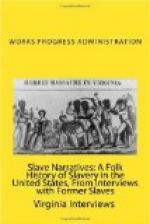“I’m old an’ can hardly git about. I’se got a cancer. De doctor done cut my lef’ brest clear offen me, but dat hurts me somtimes yit.
“I niver jined any church ’til ’bout 20 year ago, right here in Berglundtown. My church is Flowery Mount Baptist Church, an’ my Brudder Washin’ton is my pastor, an’ he is de best preacher what ever lived. No, Marse Cassedy didn’t have no church fer de slaves. Dey went to de white folks’ church.
“How do I live? Well I gits a pension of fo’ dollars a month, an’ I try to wash a leetle fer de colored folks, an’ den I beg. I can’t stay here long but God won’t low me to starve. Bless God, he’s comin’ fer me some day.”
Wayne Holliday, Ex-slave Monroe County
Mississippi Federal Writers
Slave Autobiographies
FEC
Mrs. Richard Kolb
[WAYNE HOLLIDAY Aberdeen, Mississippi]
“I was born an’ raised in Aberdeen an’ I’se been a railroad nigger fo’ mos’ of my days. I’se retired now ’cause dey say I too old to work any longer, but shucks, I ain’t half dead yet. I was born in 1853 right here close to whar I live now. My folks b’longed to de Hollidays—you know de grand folks of Miss Maria Evans? An’ we stayed right dere in de lot whar de white folks lived.
“My pa an’ my ma was named Frank an’ Sarah Holliday an’ de Cunel brung dem wid him frum North Car’lina. Dey was lot niggers an’ never worked in de fiel’ or lived in de Quarters. My pa was one of de best carpenters in de country. I was too young to work much but sometime I he’ped him ‘roun’ de house but mos’ of de time, I jes played wid my brudders an’ sisters an’ de white chullun what lived aroun’. We played marbles, ridin’ de stick hoss, an’ play house jes lak de chullun do now days, but I think we had mo’ fun. Dey was fo’teen of us in our family an’ we allus had somebody to play wid. An’ den li’l Marse Ben, he wa’nt much older dan us.
“Our marster’s name was Cunel John Holiday. He got dat title in a war before de slav’ry war. He was too old to fight in dat one, or I spect he’d got another title, lak Gen’ral or somethin’. He an’ Miss Julia—dat was his wife—was mighty good to us an’ so was Marse Tom and Marse Ben, an’ Miss Maria an’ all. When de Cunel fust come to Mississippi he bought a plantation in de prairies an’ lived dere for a while. But later he ’cided to build him a house in town so he got my pa to he’p him build it an’ it was one of de purtiest houses in Aberdeen. It look jes lak it allus did to me now. Co’se dey is worked on it several times since den, but dey ain’t changed it at all.
“My mammy did de cookin’ for de white folks dere. Dey all thought a lot of her. I never knowed much what slav’ry was ’bout, to tell de truf. De folks never treated us wrong an’ chullun in dem days didn’ get to run aroun’ lak dey do today an’ we didn’ get to hear no gossip ’bout de other niggers. Since we didn’ live in no quarters we didn’ hear nothin. Our folks never said nothin’ ’cause dey was very well satisfied lak dey was. We never hear of no whuppin’s, or runaways either, ’til afte’ de War an’ when we got older.




